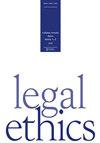Deferring to the ‘unlearned’ friend: professional ethics and the unrepresented litigant
IF 1.4
Q1 LAW
引用次数: 0
Abstract
ABSTRACT Courts are starting to keep data about the numbers of litigants who personally file court documents and appear without counsel. The growth in numbers of unrepresented litigants is aptly described as a phenomenon and can be attributed to various causes. Whether or not it is a ‘problem’ however, is arguable. This article explores the concept of the unrepresented litigant in a strange and unnavigable milieu and the ethical duties of lawyers as officers of the court in that context. Focussing on Australian examples, the primary aim of the article is to highlight the lack of guidance in both codes of ethical conduct and judicial commentary on ethical issues for lawyers faced with an unrepresented opponent. Ethical issues at various stages of the dispute resolution process are discussed, including the complexities involved with unbundled legal services. The author argues that as an officer of the court, counsel should assist the judicial officer and consider the situation through a lens of ethical reasoning, while recognising the dilemma this can pose for lawyers who must respect their duties to their own clients. The article concludes that lawyers must abide by their ethical responsibilities whether or not the opponent has representation, while acknowledging that this may be challenging for a variety of reasons. It also suggests that the absence of any reference to unrepresented litigants in ethical codes of conduct should be addressed.尊重“没有学问”的朋友:职业道德和没有律师代表的诉讼当事人
摘要法院开始保留有关亲自提交法庭文件和在没有律师的情况下出庭的诉讼当事人人数的数据。无人代表诉讼当事人人数的增长被恰当地描述为一种现象,可以归因于各种原因。然而,这是否是一个“问题”,还有待商榷。本文探讨了在一个陌生和不可航行的环境中无代表诉讼人的概念,以及在这种背景下律师作为法院官员的道德义务。文章以澳大利亚的例子为重点,主要目的是强调在面对无人代表的对手时,在道德行为准则和关于律师道德问题的司法评论方面都缺乏指导。讨论了纠纷解决过程各个阶段的道德问题,包括未捆绑的法律服务所涉及的复杂性。提交人认为,作为法院官员,律师应协助司法官员,并从道德推理的角度考虑情况,同时认识到这可能给必须尊重其对自己客户的义务的律师带来的困境。文章的结论是,无论对手是否有代表,律师都必须遵守他们的道德责任,同时承认这可能因各种原因而具有挑战性。它还建议,应解决道德行为准则中没有提及无人代表的诉讼当事人的问题。
本文章由计算机程序翻译,如有差异,请以英文原文为准。
求助全文
约1分钟内获得全文
求助全文

 求助内容:
求助内容: 应助结果提醒方式:
应助结果提醒方式:


